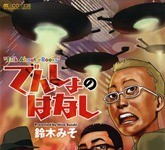 My DSL went out in a thunderstorm today, and between exhaustively troubleshooting it on the phone with an Indian-accented technician and catching up on several hundred Google Reader posts sitting in a FedEx Office (if you’re looking for a quiet place with free wifi that’s open 24 hours, I recommend it; the only drawback is there’s no refreshments), I’ve found myself without much writing time this morning. So this may be all you see from me today.
My DSL went out in a thunderstorm today, and between exhaustively troubleshooting it on the phone with an Indian-accented technician and catching up on several hundred Google Reader posts sitting in a FedEx Office (if you’re looking for a quiet place with free wifi that’s open 24 hours, I recommend it; the only drawback is there’s no refreshments), I’ve found myself without much writing time this morning. So this may be all you see from me today.
Ben Hutchins, otherwise known as Gryphon from the Undocumented Features shared writing universe that I covered in one of my “Paleo E-Books” columns, has started a blog called “Use Extra Sheets As Necessary” chronicling his experiences returning to college after the better part of two decades away from it.
Yesterday’s post was about Hutchins’s frustration with the present state of educational information technology. He’s not speaking of computer labs here, or even e-textbooks, but rather the systems that professors use to post adjuncts to the textbooks—assignments, hand-outs: the sort of thing that would have been photocopied and passed out in the days when he and I attended our respective colleges for the first time.
Hutchins writes:
The concept of offering things like coursework and class information online (even for regular old-fashioned sitting-in-a-room lecture courses) has reached a stage I like to think of as “immature proliferation” – everybody’s doing it, but no two implementations are the same. There are no standards. Every textbook publisher has its own system for offering and delivering such content. Every instructor has his own preferences. Quite a few of them have homebrewed systems of their own to add to the mix. And the university itself has multiple different mutually exclusive online information systems, some of which are preferred by some instructors, some by others.
He goes on to elaborate on some of these systems: FirstClass, Blackboard, a home-brewed Linux system one professor has put together. Not only do they bring about the confusion of having to keep up with several different on-line forums (Hutchins notes that his four classes mean he has to keep track of nine separate data streams), but they also add extra expense, such as the $70 he had to pay on top of an already high textbook price for the privilege of obtaining a product key for one of the forums.
Hutchins wryly notes that he’s returned to college at exactly the wrong time in history—twenty years ago, everyone was using handouts, and in another twenty perhaps some standards will be in place to reduce the confusion. But right now, everyone is doing his own thing, and it just adds more stress to the college experience (which, as Hutchins writes in other entries, is already stressful enough).
It’s worth keeping in mind as e-textbooks proliferate that a goal of bringing e-media to education should be to make things simpler. But right now, it only seems to be adding to the complication. (And if the current confused morass of consumer e-book standards is any indication, we may well have a long way to go on that score.)
































